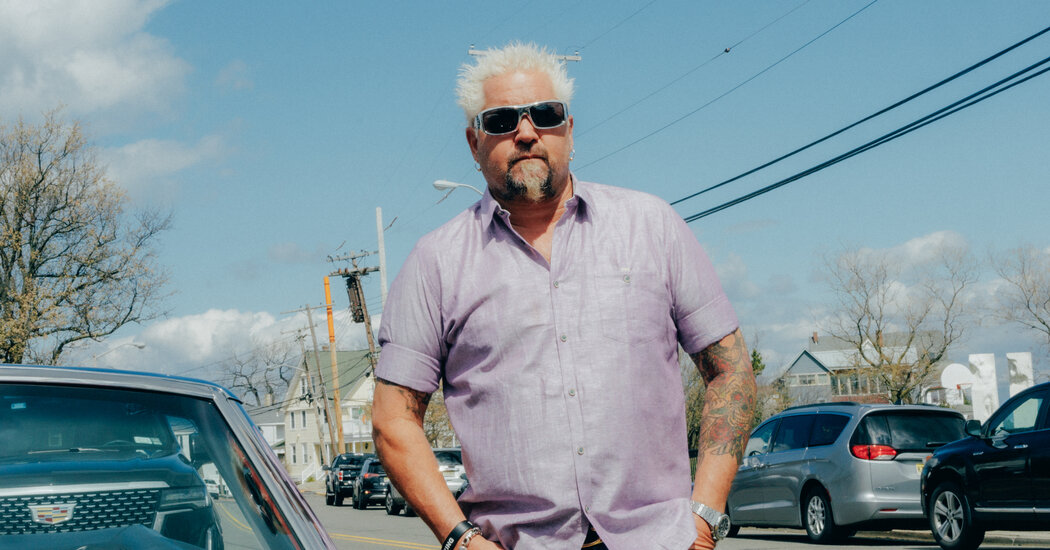
MIDDLETOWN TOWNSHIP, N.J. — Guy Fieri looks as if he has prepared his whole life to be a middle-aged rock star.
He has grays in the famous goatee now, a faint tan line beneath his chain necklace and a pair of hulking middle-finger rings that do not slow his incorrigible fist-bumping. He talks about the higher purpose of his “namaste” tattoo, and feigns outrage when no one recognizes his Dean Martin references. He revels, still, in conspicuous consumption, double-fisting naan and tandoori chicken during a recent television shoot here at a strip-mall Indian restaurant tucked between a nail salon and a wax center.
“I want to chug the chutney!” Mr. Fieri said, daring someone to stop him. “One little bump.”
It was 9:33 a.m.
But somewhere on a rickety highway near the Jersey Shore that afternoon — past the Jon Bon Jovi restaurant he said he needs to come back and visit; beyond a seaside bar called the Chubby Pickle, where he congratulated himself for not making any R-rated puns, before making several — Mr. Fieri caught himself in a reflective mood.
In the 15 years since he began “Diners, Drive-Ins and Dives,” his Food Network flagship, Mr. Fieri, 54, has become perhaps the most powerful and bankable figure in food television, the éminence grise of the eminently greasy. And by dint of that show’s success — and Mr. Fieri’s runaway celebrity, and that golden porcupine of hair, and maybe that one review of his Times Square restaurant a while back — certain perceptions have attached to him through the years, perpetuating the caricature he still often seems eager to play.
He would like a word about all that.
“If you only hear Metallica as a heavy-metal band, then you are not hearing Metallica,” Mr. Fieri said, riding shotgun after a day of filming and charity work. “Now maybe you don’t like that style. But they’re real musicians.”
For nearly two decades, since before he mailed a reality-show audition tape to the network, Mr. Fieri has plainly believed he was a real musician, contributing worthy entries to the canon.
What is striking now, long after the parody seemed to congeal, is that the wider food community stands ready to believe him.
Mr. Fieri has emerged as one of the most influential food philanthropists of the Covid age, helping to raise more than $20 million for restaurant workers. He has established himself as an industry mentor among chefs who may or may not admire his cooking but recognize his gifts as a messenger, which have boosted business for the hundreds of restaurants featured on his show. He has won the blessing of the white-tablecloth set through sheer force of charisma and relentlessness, coaxing a reconsideration of how the food establishment treated him in the first place.
“I don’t think he had the respect of people like me or people in the food industry,” said Traci Des Jardins, an acclaimed Bay Area chef who has become a friend. “He has earned that respect.”
“An amazing individual,” said the philanthropic chef José Andrés, recalling how Mr. Fieri churned out plates of turkey for wildfire evacuees in 2018.
“Whether he likes it or not,” said Andrew Zimmern, a fellow food-television veteran, “he has become an elder statesman.”
In that case, Mr. Fieri said, he looks forward to the initiation ceremony.
“Don’t you think there should be some kind of a cloak?” he asked, imagining luminaries fitting him for a tweed jacket with elbow pads over his tattoos. But, he added, “I guess I’m kind of becoming one of the guys now.”
His point, as ever, was that people are complicated, including Guy Fieri, professional uncomplicated person. Maybe especially Guy Fieri, whose very surname (it is “fee-ED-ee,” he reminds audiences, nodding at his Italian roots) demands fussiness from a man who says things like “flavor jets, activate!” for a living.
He is at once sensitive to the exaggerated persona he has embraced, challenging a reporter to name the last time his show recommended a hamburger, and acutely aware of his own ridiculousness. He calls himself semi-chunky as a matter of branding (“body by dumpling,” he said) but is actually quite trim in person, singing the praises of vegan food.
He is a son of Northern California hippies, with superfans across MAGA nation and what can seem like a bespoke set of personal politics, often using his platform to tell stories celebrating immigrants while lamenting what he sees as the country’s overreliance on welfare programs.
He can pass hours, by land or fishing boat, reflecting on life and family with a close friend, Rob Van Winkle, whom Mr. Fieri addresses as Ninja and most others know as Vanilla Ice.
“Some of us never grow up,” said Mr. Van Winkle, who attributed Mr. Fieri’s nickname for him to his rap in the 1991 “Teenage Mutant Ninja Turtles” sequel, adding that he has been renovating the chef’s new home in Palm Beach County, Fla., a short drive from his own. “When Guy and I are together, we’re like the oldest teenagers in town.”
The tonal whiplash in Mr. Fieri’s company can be dizzying. He compares himself in one breath to Happy Gilmore, Adam Sandler’s rampaging golf star of the 1990s (“He’s a hockey player that makes money playing golf, and I’m a cook that makes money doing television”) and speaks in the next of his “fiduciary responsibility” to continue showcasing local restaurants.
He can edge toward profundity discussing the America he sees in his travels — comparing it to an overstuffed washing machine, clanking through its burdens — before defaulting to pablum about a national shortage of hugs.
He has learned that moderation has its place, he suggests, but only in moderation — a principle best expressed, perhaps inevitably, through the Tao of Lars Ulrich, the Metallica drummer.
Mr. Fieri was filming at the Chubby Pickle, in Highlands, N.J., when a chef preparing pork tacos seemed to skimp on the salsa. Mr. Fieri objected.
When Metallica cuts an album, he asked, doesn’t the band go heavy on the high-hat? Don’t they give the people what they want?
“You get as much Lars,” Mr. Fieri said, “as Lars wants to give you.”
Riding the ‘Fame Rocket’
The red bowling shirt was probably a giveaway.
But for the first 25 seconds of his 2005 audition reel for “The Next Food Network Star,” Mr. Fieri presented himself as a proper snob. He welcomed viewers to Sonoma County and pledged to prepare a dish “not in fusion but in con-fusion” — a Gorgonzola tofu sausage terrine over a “mildly poached” ostrich egg, with Grape-Nuts (this was wine country, after all) and pickled herring mousse.
Mr. Fieri shivered at his own faux brilliance. He clasped his hands and stared, as if waiting for his audience to agree. And then: “Ha, ha, haaa. No, seriously, folks, real food for real people. That’s the idea.”
Mr. Fieri proceeded to make something he calls the jackass roll — rice, pork butt, fries and avocado — so named, he said, because a friend told him he looked like a jackass preparing it. He described his parents’ macrobiotic diet in his youth, saddling him with “enough bulgur and steamed fish to kill a kid” and leaving him no choice but to cook up alternatives.
He ticked through his well-curated biography — a year studying in France; a hospitality degree from the University of Nevada, Las Vegas; a stab at his own casual restaurants back in California — with such conviction that it almost made sense watching a man lay fries and barbecue over sushi rice.
Revisiting the video, what stands out is how fully formed Mr. Fieri’s public image was before a single television producer could think to meddle.
His hairstylist friend gave him the bleached spikes on a lark one day, and they stuck. His buddies knew his talents for table-to-table rat-a-tat, and urged him to make a tape. The ethos was effectively airlifted to “Diners, Drive-Ins and Dives” shortly after he won the next-food-star competition, and has never much changed.
“It’s been super-hard to rip off, and I’ve tried numerous times,” said Jordan Harman, who helped develop the show in 2007 and is now at A+E Networks. “You can redo the same beats, the same kind of places, the same kind of food. But there’s a magic that he brings that is really not replicable.”
Mr. Fieri took to fame quickly, hustling as though the window might be brief. He appeared at local fairs and casino shows that seemed beneath him (Mr. Harman thought), because they invited him. He autographed spatulas and bell peppers because fans asked him to. He toured the country in a flame-painted bus stocked with Pabst Blue Ribbon because what better way to travel? He wore sunglasses on the back of his head because sure, why not?
Friends say Mr. Fieri expanded his empire with almost clinical resolve, tending to a portfolio that came to include books, knives, a winery, a line of tequilas and several shows. Today, his name graces dozens of restaurants across six countries and more than a few cruise ships.
“This guy don’t sit down,” said Mr. Van Winkle, who traced their friendship to a chance encounter years ago at an airport Starbucks in Charlotte, N.C. “I don’t sit down a lot, too, and I look at him and go, ‘Bro, you don’t sit down.’ ”
Mr. Fieri remarked in 2010 that his “fame rocket” would shoot skyward for only so long, reasoning that he must “do what I can for the program while it lasts.” (By “the program,” he meant his wife, Lori, and two sons in Santa Rosa, Calif., along with his parents and a cast of tag-along pals with names like Gorilla and Dirty P.)
His Times Square restaurant, Guy’s American Kitchen & Bar, can feel in hindsight like an exercise in overextension, an assumption of manifest destiny powered by swagger and a signature Donkey Sauce.
“Like, ‘Oh, yeah, I’m going to do this, and it’s just going to be another big success for me,’” said Mr. Zimmern, summarizing Mr. Fieri’s confidence. “But you need to make sure that the food is absolutely perfect.”
It was not.
And that blazing New York Times review in 2012 (“Guy Fieri, have you eaten at your new restaurant?”) dovetailed with an already-rolling sendup of Mr. Fieri across the culture. He was skewered on “Saturday Night Live,” preparing Thanksgiving “turducken-rab-pig-cow-cow-horse-nish-game-hen” fried in Jägermeister. His likeness became fodder for undercooked Halloween costumes nationwide.
He was invited to a Manhattan roast of Anthony Bourdain, a frequent antagonist who once said that Mr. Fieri appeared “designed by committee,” and often took more incoming than the honoree.
“The guy who just dropped a 500-seat deuce into Times Square,” Mr. Bourdain called him. (The restaurant closed in 2017.)
Lee Brian Schrager, the founder of the South Beach Wine & Food Festival, remembered the evening as “the single most uncomfortable night of my life” — and, looking back, a snapshot of a distant time.
“He went through the war,” Mr. Schrager said of Mr. Fieri. “He won.”
New Context, Same Shtick
So, has he changed, or have we?
Mr. Fieri appraises himself now as “a little more mellow, a little more methodical” — and maybe a little likelier to prize mentorship of the next class of television chef, including his son Hunter, over his own celebrity.
The moment has likewise tilted his way, at a time when there can seem to be less cultural currency in sarcastic detachment. “Can someone please explain to me what the hell Guy Fieri ever did to anyone?” the comedian Shane Torres asked, earnestly, in a 2017 routine. “As far as I can tell, all he ever did was follow his dreams.”
It has helped that Mr. Fieri is well suited to the modern internet, a TikTok regular and walking meme who generates headlines that can register as Onion-ish absent close inspection.
“Is Guy Fieri to blame for Dogecoin’s latest record high?” Fortune wondered last May.
“Amid Ukraine-Russia war,” read a Fox News web piece in March, “Guy Fieri’s new season of ‘Tournament of Champions III’ provides comfort, unity.”
Yet the likeliest explanation for his durability, for his heightened esteem among some peers, is deceptively simple.
“He seeks to understand rather than be understood,” Mr. Zimmern said, “which I think is as high a compliment as I can give.”
For all the tropes and totems on “Diners” — the loud shirts and little hoop earrings; the adult baby talk (“me likey wingy”); the red Camaro whose driver-side door he opens and shuts at every stop for the cameras, without necessarily hopping inside — he is, at core, hosting a travel show.
Viewers see a culinary backpacker cosplaying as the ugly American, a man always seeking, even if all roads lead to ambient comfort. The episodes blur, their locations at once distinctive and indistinguishable. California and Wyoming and Maine do not seem so far apart.
“He goes to all these diners, drive-ins and dives,” said one fan, Jim McGinnis, 77, explaining the show’s appeal as Mr. Fieri administered handshakes and how-ya-doing-brothers at a charity event for New Jersey veterans. “It’s just a pleasure.”
It helps that no one wrings more theater from the preordained: Mr. Fieri arrives at a chosen spot. He seems excited. He riffs, a little uncomfortably, to make the jittery proprietors more comfortable. (The stop at the Indian restaurant, Haldi Chowk in Middletown Township, N.J., included nods to “Wheel of Fortune,” “Forrest Gump” and “My Cousin Vinny,” with a brief meditation on the differences between I.T., iced tea and Ice-T for reasons that eluded the room.)
Eventually, a chef has walked Mr. Fieri through the preparation of a favored dish. The host takes a bite — in this scene, it is the tandoori chicken — and shifts his weight a bit. He stands back, silent. His eyes dart mischievously, as if he has just gotten away with something. He wanders off, pretending to collect himself. The chef smiles. The big reveal only ever goes one way.
“Not good, chef. Not good at all,” Mr. Fieri says, the oldest left turn in the TV judge’s manual. “Fantastic.”
Rachael Ray, a friend whom Mr. Fieri cites as an influence, compared his people skills to a game of tag: You will like him. Denying as much midpursuit only wastes everyone’s time. “He just keeps chasing you,” she said.
Mr. Zimmern described him as a politician, “always talking to his base,” forever the person he told them he was.
And if Mr. Fieri has carefully avoided the public politics of some Trump-denouncing peers, a day on the road with him during filming can feel something like a campaign swing before the Iowa caucuses: an hour in each ZIP code, a quick check with an aide to make sure he knows what town he’s in, an inveterate fondness for name-dropping.
“I learned this from Henry Winkler, one of my heroes …”
“My buddy, Sammy Hagar, who’s my business partner …”
That Mr. Fieri does not appear to have an off switch is consistent with the public record. Several friends compared him, warmly enough, to some natural disaster or another. “Hurricane Guy,” Mr. Harman said.
Reminded of his 2010 line about capitalizing before his “fame rocket” crashed to earth, Mr. Fieri insisted he still viewed his celebrity horizon as finite.
“There will be a time when the light doesn’t shine as bright on the golden locks,” he said. “Which is cool.”
He was not entirely convincing on either score. But until that day comes, he suggested, he would keep up appearances, with one exception.
“Everybody’s like, ‘You bleach your hair. Why don’t you dye your goatee?’ ” he said, rubbing at his grays. “I’m like, ‘You know what? Enough.’ ”
He smirked a little, raising his head in concession to the moneymaker atop it.
“This, I got stuck with,” he said. “This kind of happened.”




